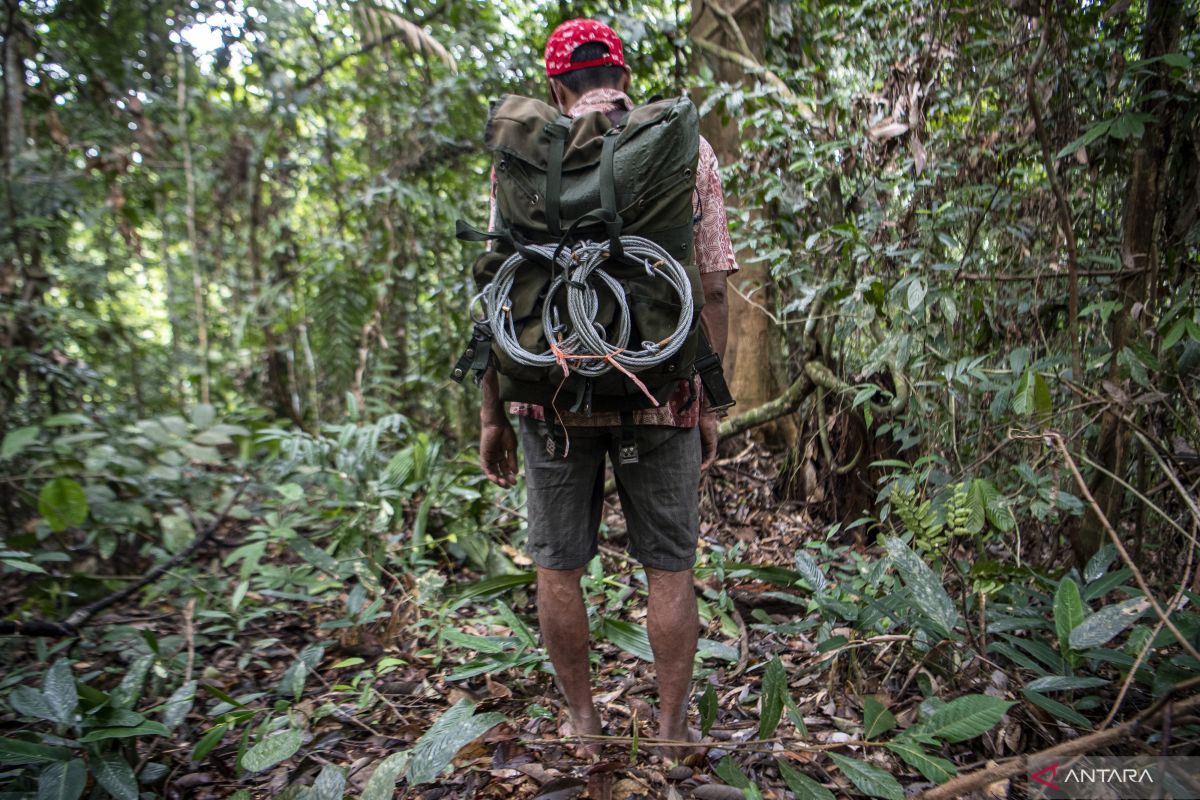With only a pair of sandals to cover his foot, the 74-year-old man assisted the patrol team to search for a tiger trap in the South Sumatra-Bengkulu section of the national park.
Mawi effortlessly wandered the forest to lead the patrol team. Indeed, before helping the patrol team, Mawi was one of the tiger hunters in the national park – the opponent of the patrol team.
Mawi recounted having spent months in the forest to hunt for the tiger, leaving his wife and six children at home.
He said that in the past, he did not have other options apart from hunting tigers to earn a living, an illegal profession that exposed him to dangers in the forests and criminal prosecution if arrested.
“I did not want (to hunt the tiger), but it is my only way (to earn a living),” the former tiger hunter, who currently has 11 grandchildren, stated.
Mawi has no fields or land that he can use to cultivate plants nor a permanent job that he could rely upon to feed his family living in Muara Tiku Village, North Musi Rawas District.
Mawi said that he began hunting for tigers in 1974 at the age of 14, and the experience he gained after hunting for years has sharpened his instinct and trained his vision to observe and monitor the forest’s surrounding conditions.
“Since that age, I began my adventure in the forest to hunt the tiger. If we are not vigilant in the forest, we are finished,” Mawi remarked.
In the past, with only a firelighter, an oil lamp, and a small knife, he entered the forest to hunt the tiger by planting a steel sling at the location where the species wandered in order to trap the animal.
His instinct to earn a living had suppressed his fear of the beast.
If a tiger is caught in his trap, Mawi will kill the tiger by striking it repeatedly with a wood log. After the tiger is dead, he will dissect its belly to extract all its inner organs and cut the tiger meat, which he could make jerky for his food reserve. The tiger bone and skin will be saved and would be sold once he leaves the forest.
Mawi said that the tiger collector would pay him up to Rp25 million (US$1,750) for every tiger that he killed.
He could not specify the exact number of tigers that he killed, yet he recounted that his killing tally had reached hundreds. In 2019, Mawi’s efforts to hunt the tiger went futile.
“I sold my last hunt four years ago. If in 1974, the tiger was priced at Rp25 thousand (around US$157, inflation-adjusted), then today’s price may reach Rp80 million (US$5,600),” Mawi remarked.
Mawi’s path to repentance
In 2019, Mawi was firmly determined to abandon tiger hunting that he relied on for a living for over four decades.
“I swear, in the name of the Almighty God and His Prophet, I will not hunt a tiger anymore,” Mawi pledged.
It turns out that the Lingkar Inisiatif organisation that focuses on animal conservation and prevention of natural crimes had a role in convincing Mawi to stop hunting and killing tigers.
Convincing Mawi to abandon his tiger-hunting activities was no simple task, according to Lingkar Inisiatif Director Iswadi.
Iswadi said that he needed to engage in undercover activities by pretending to become a tiger skin collector and use the alias Deki to be able to meet Mawi in 2019.
Iswadi’s efforts to locate Mawi bore fruit when he met his older brother, Rudi, also a hunter, who directed him to Mawi when he asked Rudi to find a tiger skin for him.
“He said that he has no tiger skin despite Mawi being a prolific hunter and being normally successful in his hunt,” Iswadi recalled.
He said that Mawi was a respected figure among tiger hunters in the North Musi Rawas region.
To remain close to Mawi, Iswadi decided to join him to hunt the tiger and stay in the forest for weeks.
During his encounter with Mawi, Iswadi, who had successfully brought 25 tiger hunters to jail for illegal hunting in the past, decided to use another approach to convince Mawi to reconsider his tiger-hunting habit by offering a new career opportunity.
“Gradually, Mawi repented and decided to abandon his tiger-hunting activities,” the director stated.
Mawi then became a honey farmer with assistance from Lingkar Inisiatif. He also harvests forest resources, such as bamboo powder and bamboo champer, to earn extra money.
After personally abandoning tiger hunting, Mawi also encourages fellow tiger hunters to abandon their activities. Mawi later decided to join the Lingkar Inisiatif to help the patrol team.
“Mawi has been successful in convincing other nine hunters to abandon their activities. Mawi is respected by other hunters, and once Mawi convinced other hunters to follow his lead, they also decided to end hunting for tigers,” Iswadi remarked.
Now, instead of hunting tigers in the forest, Mawi visits the forest to hunt tiger traps installed by other hunters.
On hearing his father’s decision to abandon tiger hunting, his eldest son Muhammad, aged 38, said that it was a moment of joy for him and his siblings, who were concerned about their father’s safety while leaving them to hunt the tiger.
“My father can spend months to hunt the tiger. At one time, he even spent one year in the forest without going home nor informing us about his whereabouts,” Muhammad recalled.
“The family is behind our father to support his decision. My father is true to his word and will never break his pledge,” he added.
Addressing tiger hunting issues
The Kerinci Seblat National Park Region III South Sumatra-Bengkulu Management Department Head, Zainudin, stated that according to the observation of patrol teams and monitoring the camera installed within the forest, the remaining Sumatran tiger (Panthera tigris sumatrae) population is estimated to reach only 30.
Rampant hunting perpetrated by hunters in the Mukomuko region in Bengkulu as well as in Musi Rawas and North Musi Rawas regions in South Sumatra is causal to the extreme decline in the population of the Sumatran tiger.
To address the tiger hunting issue, the Lingkar Inisiatif organisation has conducted routine patrols since 2021 to clear tiger traps and persuade tiger hunters to abandon their activities.
“The hunting activities have declined by 50 percent, as we found only a small number of lion traps this year as compared to the traps we found two or three years ago,” Zainudin remarked.
The department head said that tiger traps found during routine patrols have steadily declined after 2020, the very last year when the total number of traps neutralised by the authority reached two thousand.
He also lauded Lingkar Inisiatif’s active efforts to persuade tiger hunters to abandon their activities that had yielded a satisfactory result, as was seen in the case of Mawi.
“Mawi has completely changed. In the past, he would not come home for months in order to hunt the tiger, but now, he is always ready to accompany our patrol and told us the tiger trap location,” Zainudin stated.
Apart from directly engaging with tiger hunters, the Lingkar Inisiatif organisation also collaborates with clerics of the Indonesian Ulema Council (MUI) to address the tiger hunting issue, he noted.
“They are also collaborating with the MUI, especially the Lebong District MUI. They have a huge task to persuade tiger hunters (to stop their activities). Not all actions require legal action because an emotional approach will better convince them that their action is wrong,” the department head emphasized.
Mawi's story is a real example of how persuasion and personal engagement can be successful in bringing about a sense of realization and repentance among people to abandon tiger hunting activities that are harmful to the forests, endangered species, and themselves.
Related news: A tale of friendship between Situak people and tigers
Related news: Sumatran tiger captured in North Sumatra's Padang Lawas: BKSDA
Translator: Nova Wahyudi, Nabil Ihsan
Editor: Sri Haryati
Copyright © ANTARA 2022












